When the President of the United States travels outside the country, he brings his own car with him. Moments after Air Force One landed at the Hanoi airport last May, President Barack Obama ducked into an eighteen-foot, armor-plated limousine—a bomb shelter masquerading as a Cadillac—that was equipped with a secure link to the Pentagon and with emergency supplies of blood, and was known as the Beast. Hanoi’s broad avenues are crowded with honking cars, storefront venders, street peddlers, and some five million scooters and motorbikes, which rush in and out of the intersections like floodwaters. It was Obama’s first trip to Vietnam, but he encountered this pageant mostly through a five-inch pane of bulletproof glass. He might as well have watched it on TV.
Obama was scheduled to meet with President Trần Đại Quang, and with the new head of Vietnam’s national assembly. On his second night in Hanoi, however, he kept an unusual appointment: dinner with Anthony Bourdain, the peripatetic chef turned writer who hosts the Emmy-winning travel show “Parts Unknown,” on CNN. Over the past fifteen years, Bourdain has hosted increasingly sophisticated iterations of the same program. Initially, it was called “A Cook’s Tour,” and aired on the Food Network. After shifting to the Travel Channel, it was renamed “Anthony Bourdain: No Reservations,” and it ran for nine seasons before moving to CNN, in 2013. All told, Bourdain has travelled to nearly a hundred countries and has filmed two hundred and forty-eight episodes, each a distinct exploration of the food and culture of a place. The secret ingredient of the show is the when-in-Rome avidity with which Bourdain partakes of indigenous custom and cuisine, whether he is pounding vodka before plunging into a frozen river outside St. Petersburg or spearing a fatted swine as the guest of honor at a jungle longhouse in Borneo. Like a great white shark, Bourdain tends to be photographed with his jaws wide open, on the verge of sinking his teeth into some tremulous delicacy. In Bourdain’s recollection, his original pitch for the series was, roughly, “I travel around the world, eat a lot of shit, and basically do whatever the fuck I want.” The formula has proved improbably successful.
People often ask Bourdain’s producers if they can tag along on an escapade. On a recent visit to Madagascar, he was accompanied by the film director Darren Aronofsky. (A fan of the show, Aronofsky proposed to Bourdain that they go somewhere together. “I kind of jokingly said Madagascar, just because it’s the farthest possible place,” he told me. “And Tony said, ‘How’s November?’ ”) A ride-along with Bourdain promises the sidekick an experience that, in this era of homogenized tourism, is all too rare: communion with a foreign culture so unmitigated that it feels practically intravenous. Parachuted into any far-flung corner of the planet, Bourdain ferrets out the restaurant, known only to discerning locals, where the grilled sardines or the pisco sours are divine. Often, he insinuates himself into a private home where the meal is even better. He is a lively dining companion: a lusty eater and a quicksilver conversationalist. “He’s got that incredibly beautiful style when he talks that ranges from erudite to brilliantly slangy,” his friend Nigella Lawson observed. Bourdain is a font of unvarnished opinion, but he also listens intently, and the word he uses perhaps more than any other is “interesting,” which he pronounces with four syllables and only one “t”: in-ner-ess-ting.
Before becoming famous, Bourdain spent more than two decades as a professional cook. In 2000, while working as the executive chef at Les Halles, a boisterous brasserie on Park Avenue South, he published a ribald memoir, “Kitchen Confidential.” It became a best-seller, heralding a new national fascination with the grubby secrets and “Upstairs Downstairs” drama of the hospitality industry. Bourdain, having established himself as a brash truth-teller, got into public spats with more famous figures; he once laid into Alice Waters for her pious hatred of junk food, saying that she reminded him of the Khmer Rouge. People who do not watch Bourdain’s show still tend to think of him as a savagely honest loudmouthed New York chef. But over the years he has transformed himself into a well-heeled nomad who wanders the planet meeting fascinating people and eating delicious food. He freely admits that his career is, for many people, a fantasy profession. A few years ago, in the voice-over to a sun-dappled episode in Sardinia, he asked, “What do you do after your dreams come true?” Bourdain would be easy to hate, in other words, if he weren’t so easy to like. “For a long time, Tony thought he was going to have nothing,” his publisher, Dan Halpern, told me. “He can’t believe his luck. He always seems happy that he actually is Anthony Bourdain.”
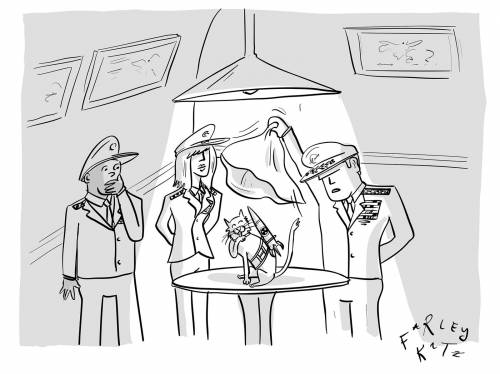
“We have no choice but to resort to war kitties—may God have mercy on our souls.”
The White House had suggested the meeting in Vietnam. Of all the countries Bourdain has explored, it is perhaps his favorite; he has been there half a dozen times. He fell for Hanoi long before he actually travelled there, when he read Graham Greene’s 1955 novel, “The Quiet American,” and the city has retained a thick atmosphere of colonial decay—dingy villas, lugubrious banyan trees, monsoon clouds, and afternoon cocktails—that Bourdain savors without apology. Several years ago, he seriously considered moving there.
Bourdain believes that the age of the fifteen-course tasting menu “is over.” He is an evangelist for street food, and Hanoi excels at open-air cooking. It can seem as if half the population were sitting around sidewalk cookfires, hunched over steaming bowls of phở. As a White House advance team planned the logistics for Obama’s visit, an advance team from Zero Point Zero, the company that produces the show, scoured the city for the perfect place to eat. They selected Bún chả Hương Liên, a narrow establishment across from a karaoke joint on a busy street in the Old Quarter. The restaurant’s specialty is bún chả: springy white noodles, smoky sausage, and charred pork belly served in a sweet and pungent broth.
At the appointed hour, Obama exited the Beast and walked into the restaurant behind a pair of Secret Service agents, who cleared a path for him, like linemen blocking for a running back. In a rear dining room on the second floor, Bourdain was waiting at a stainless-steel table, surrounded by other diners, who had been coached to ignore the cameras and Obama, and to focus on their bún chả. Like many restaurants in Vietnam, the facility was casual in the extreme: diners and servers alike swept discarded refuse onto the floor, and the tiles had acquired a grimy sheen that squeaked beneath your feet. Obama was wearing a white button-down, open at the collar, and he greeted Bourdain, took a seat on a plastic stool, and happily accepted a bottle of Vietnamese beer.
“How often do you get to sneak out for a beer?” Bourdain asked.
“I don’t get to sneak out, period,” Obama replied. He occasionally took the First Lady to a restaurant, he said, but “part of enjoying a restaurant is sitting with other patrons and enjoying the atmosphere, and too often we end up getting shunted into one of those private rooms.”
As a young waitress in a gray polo shirt set down bowls of broth, a plate of greens, and a platter of shuddering noodles, Bourdain fished chopsticks from a plastic container on the table. Obama, surveying the constituent parts of the meal, evinced trepidation. He said, “All right, you’re gonna have to—”
“I’ll walk you through it,” Bourdain assured him, advising him to grab a clump of noodles with chopsticks and dunk them into the broth.
“I’m just gonna do what you do,” Obama said.
“Dip and stir,” Bourdain counselled. “And get ready for the awesomeness.”
Eying a large sausage that was floating in the broth, Obama asked, “Is it generally appropriate to just pop one of these whole suckers in your mouth, or do you think you should be a little more—”
“Slurping is totally acceptable in this part of the world,” Bourdain declared.
Obama took a bite and let out a low murmur. “That’s good stuff” he said, and the two of them—lanky, conspicuously cool guys in late middle age—slurped away as three cameras, which Bourdain had once likened to “drunken hummingbirds,” hovered around them. Noting the unaffected rusticity of the scene, Obama was reminded of a memorable meal that he had eaten as a child, in the mountains outside Jakarta. “You’d have these roadside restaurants overlooking the tea fields,” he recalled. “There’d be a river running through the restaurant itself, and there’d be these fish, these carp, that would be running through. You’d pick the fish. They’d grab it for you and fry it up, and the skin would be real crispy. They just served it with a bed of rice.” Obama was singing Bourdain’s song: earthy, fresh, free of pretense. “It was the simplest meal possible, and nothing tasted so good.”
But the world is getting smaller, Obama said. “The surprises, the serendipity of travel, where you see something and it’s off the beaten track, there aren’t that many places like that left.” He added, wistfully, “I don’t know if that place will still be there when my daughters are ready to travel. But I hope it is.” The next day, Bourdain posted a photograph of the meeting online. “Total cost of Bun cha dinner with the President: $6.00,” he tweeted. “I picked up the check.”
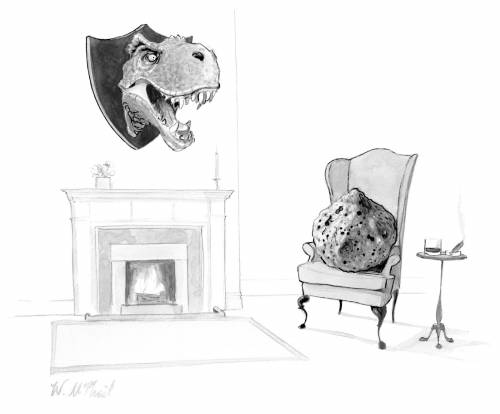
“Three years I haven’t had a cigarette, and I just started again,” Bourdain said when I met him shortly afterward, at the bar of the Metropole Hotel, where he was staying. He cocked an eyebrow: “Obama made me do it.” Bourdain, who is sixty, is imposingly tall—six feet four—and impossibly lean, with a monumental head, a caramel tan, and carefully groomed gray hair. He once described his body as “gristly, tendony,” as if it were an inferior cut of beef, and a recent devotion to Brazilian jujitsu has left his limbs and his torso laced with ropy muscles. With his Sex Pistols T-shirt and his sensualist credo, there is something of the aging rocker about him. But if you spend any time with Bourdain you realize that he is controlled to the point of neurosis: clean, organized, disciplined, courteous, systematic. He is Apollo in drag as Dionysus.
“He has his mise en place,” his friend the chef Éric Ripert told me, noting that Bourdain’s punctiliousness is a reflection not only of his personality and his culinary training but also of necessity: if he weren’t so structured, he could never stay on top of his proliferating commitments. In addition to producing and starring in “Parts Unknown,” he selects the locations, writes the voice-overs, and works closely with the cinematographers and the music supervisors. When he is not on camera, he is writing: essays, cookbooks, graphic novels about a homicidal sushi chef, screenplays. (David Simon recruited him to write the restaurant scenes in “Treme.”) Or he is hosting other TV shows, such as “The Taste,” a reality competition that ran for two years on ABC. Last fall, during a hiatus from filming, he launched a fifteen-city standup tour. Ripert suggested to me that Bourdain may be driven, in part, by a fear of what he might get up to if he ever stopped working. “I’m a guy who needs a lot of projects,” Bourdain acknowledged. “I would probably have been happy as an air-traffic controller.”
As he sipped a beer and picked at a platter of delicate spring rolls, he was still fidgeting with exhilaration from the encounter with Obama. “I believe what’s important to him is this notion that otherness is not bad, that Americans should aspire to walk in other people’s shoes,” he reflected. This idea resonates strongly with Bourdain, and, although he insists his show is a selfish epicurean enterprise, Obama’s ethic could be the governing thesis of “Parts Unknown.” In the opening moments of an episode set in Myanmar, Bourdain observes, “Chances are you haven’t been to this place. Chances are this is a place you’ve never seen.”
From the moment Bourdain conceives of an episode, he obsesses over the soundtrack, and for the sequence with Obama he wanted to include the James Brown song “The Boss.” When the producers cannot afford to license a song, they often commission music that evokes the original. For a “Big Lebowski” homage in a Tehran episode, they arranged the recording of a facsimile, in Farsi, of Dylan’s “The Man in Me.” But Bourdain wanted the original James Brown track, no matter how much it cost. “I don’t know who’s paying for it,” he said. “But somebody’s fucking paying for it.” He sang the chorus to himself—“I paid the cost to be the boss”—and remarked that one price of leadership, for Obama, had been a severe constraint on the very wanderlust that Bourdain personifies. “Even drinking a beer for him is a big thing,” he marvelled. “He’s got to clear it.” Before he said goodbye to Obama, Bourdain told me, he had underlined this contrast. “I said, ‘Right after this, Mr. President, I’m getting on a scooter and I’m going to disappear into the flow of thousands of people.’ He got this look on his face and said, ‘That must be nice.’ ”
Tom Vitale, the episode’s director, who is in his mid-thirties and has an air of harried intensity, stopped by to check with Bourdain about a shoot that was planned for later that evening. It generally takes Bourdain about a week of frantic work on location to film each episode. He has a small crew—two producers and a few cameramen—who recruit local fixers and grips. His team often shoots between sixty and eighty hours of footage in order to make an hour-long episode. Vitale, like others on the crew, has worked with Bourdain for years. When I asked him what his interactions with the White House had been like, he said, with bewilderment, “I’m shocked we all passed the background check.”
Bourdain was eager to shoot at a bia-hơi joint, a popular Hanoi establishment specializing in chilled draft beer. “We’re hoping for beer?” he asked.
“We’re hoping for beer,” Vitale confirmed. They had already scouted a place. “But, if the energy there is only fifty per cent, maybe not.”
Bourdain agreed. “We don’t want to manufacture a scene,” he said. He makes a fetish of authenticity, and disdains many conventions of food and travel programming. “We don’t do retakes,” he said. “We don’t do ‘hello’ scenes or ‘goodbye, thank you very much’ scenes. I’d rather miss the shot than have a bogus shot.” When he meets someone at a roadside café, he wears a lavalier microphone, which picks up the sort of ambient noise—blaring car horns, shrieking cicadas—that sound designers normally filter out. “We want you to know what a place sounds like, not just what it looks like,” Jared Andrukanis, one of Bourdain’s producers, told me. “The guys who mix the show hate it. They hate it, but I think they love it.”
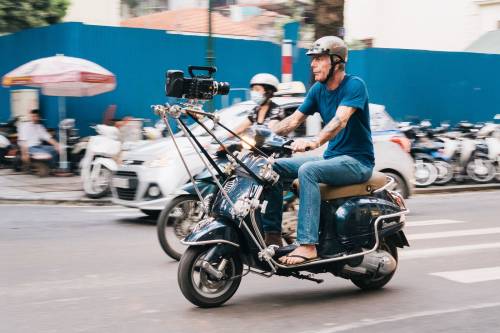
After filming with President Obama, Bourdain said, “I’m going to disappear into the flow of thousands of people.”
Bourdain is exceptionally close to his crew members, in part because they are steady companions in a life that is otherwise transient. “I change location every two weeks,” he told me. “I’m not a cook, nor am I a journalist. The kind of care and feeding required of friends, I’m frankly incapable of. I’m not there. I’m not going to remember your birthday. I’m not going to be there for the important moments in your life. We are not going to reliably hang out, no matter how I feel about you. For fifteen years, more or less, I’ve been travelling two hundred days a year. I make very good friends a week at a time.”
Until he was forty-four, Bourdain saw very little of the world. He grew up in Leonia, New Jersey, not far from the George Washington Bridge. His father, Pierre, an executive at Columbia Records, was reserved, and given to reading silently on the couch for long stretches, but he had adventurous taste in food and movies. Tony recalls travelling into New York City with his father during the seventies to try sushi, which at the time seemed impossibly exotic.
The only experience of real travel that Bourdain had as a child was two trips to France. When he was ten, his parents took him and his younger brother, Chris, on a summer vacation to France, where relatives of his father had a home in a chilly seaside village. Tony had what he has since described as a Proustian encounter with a huge oyster, eating it freshly plucked from the sea. (“Tony likes to play up the oyster episode,” Chris, who is now a banker, told me. “I have no idea if that’s fact or fiction.”) The brothers played in old Nazi blockhouses on the beach, and spent hours reading “Tintin” books—savoring tales of the roving boy reporter and poring over Hergé’s minutely rendered illustrations of Shanghai, Cairo, the Andes. The stories, Bourdain recalls, “took me places I was quite sure I would never go.”
His mother, Gladys, a copy editor at the Times, was formidable and judgmental, and often clashed with her son. In high school, Bourdain fell in love with an older girl, Nancy Putkoski, who ran with a druggie crowd, and he started dabbling in illicit substances himself. At one point, Gladys told her son, “I love you dearly, but, you know, I don’t like you very much at present.” In 1973, Bourdain finished high school a year early and followed Putkoski to Vassar. But he dropped out after two years and enrolled at the Culinary Institute of America, in Hyde Park, New York.
It was not his first experience in the kitchen: the summer after finishing high school, he had been a dishwasher at the Flagship, a flounder-and-fried-clams restaurant in Provincetown. In “Kitchen Confidential,” he recounts a defining moment, during a wedding party at the Flagship, when he witnessed the bride sneak outside for an impromptu assignation with the chef. The punch line: “I knew then, dear reader, for the first time: I wanted to be a chef.”
The story captures Bourdain’s conception of the cook’s vocation as both seductively carnal and swaggeringly transgressive. One of his favorite movies is “The Warriors,” the cult 1979 film about street gangs in New York, and it was the outlaw machismo of the kitchen that attracted him. For a time, he walked around with a set of nunchucks in a holster strapped to his leg, like a six-shooter; he often posed for photographs wearing chef’s whites and clutching the kind of long, curved knife you might use to disembowel a Gorgon. (The cover of “Kitchen Confidential” showed Bourdain with two ornamental swords tucked into his apron strings.) Long before he was the kind of international celebrity who gets chased by fans through the airport in Singapore, Bourdain knew how to arrange his grasshopper limbs into a good pose, and from the beginning he had a talent for badassery.
After graduating from the Culinary Institute, in 1978, he moved with Putkoski into a rent-stabilized apartment on Riverside Drive. They married in 1985. She had various jobs, and Bourdain found work at the Rainbow Room, in Rockefeller Center. When I asked about the marriage, which ended in 2005, he likened it to the Gus Van Sant film “Drugstore Cowboy,” in which Matt Dillon and Kelly Lynch play drug addicts who rob pharmacies in order to support their habit. “That kind of love and codependency and sense of adventure—we were criminals together,” he said. “A lot of our life was built around that, and happily so.” When Bourdain tells stories about the “seriously knuckleheaded shit” he did while using narcotics—being pulled over by the cops with two hundred hits of blotter acid in the car, being stalked by the Drug Enforcement Administration while trying to retrieve a “letter from Panama” at the post office—he vaguely alludes to “another person” who was by his side. He is careful not to mention Putkoski by name. Aside from the drugs, they lived a relatively quiet domestic life. In the evenings, they ordered takeout and watched “The Simpsons.” Every few years, after they saved up some money, Tony and Nancy went on vacation to the Caribbean. Otherwise, they did not travel.
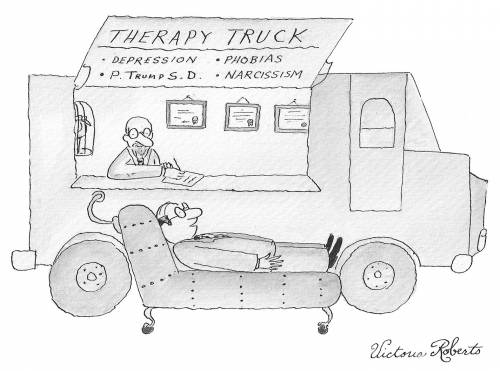
But Bourdain did travel around New York, as a journeyman chef. At the Rainbow Room, he worked the buffet table, and he was a sous-chef at W.P.A., in SoHo. He worked at Chuck Howard’s, in the theatre district; at Nikki and Kelly, on the Upper West Side; at Gianni’s, a tourist trap at the South Street Seaport; at the Supper Club, a nightspot in midtown where the emphasis was not the food. Eventually, he acquired a crew of associates who migrated with him from one restaurant to the next. His friend Joel Rose, a writer who has known Bourdain since the eighties, told me, “He was a fixer. Anytime a restaurant was in trouble, he came in and saved the day. He wasn’t a great chef, but he was organized. He would stop the bleeding.”
In 1998, he answered an ad in the Times and got the executive-chef job at Les Halles. It was an ideal fit for Bourdain: an unpretentious brasserie with its own butcher, who worked next to the bar, behind a counter stacked with steak, veal, and sausages. “Kitchen Confidential,” which was excerpted in this magazine, was inspired by “Down and Out in Paris and London,” in which George Orwell describes chefs as “the most workmanlike class, and the least servile.” Karen Rinaldi, the editor who acquired the book, for Bloomsbury, told me that she underestimated the impact it would have. “It was a flyer,” she said—the profane musings of a guy who broiled steaks for a living. “But a lot of the books that end up shifting the culture are flyers.”
“Kitchen Confidential” was filled with admonitions: Bourdain assailed Sunday brunch (“a dumping ground for the odd bits left over from Friday and Saturday”) and advised against ordering fish on Mondays, because it is typically “four to five days old.” The book was marketed as a dispatch from the scullery, the type of tell-all that might be more interesting to the naïve restaurant-goer than to the battle-seasoned cook. (“I won’t eat in a restaurant with filthy bathrooms,” Bourdain warned. “They let you see the bathrooms. If the restaurant can’t be bothered to replace the puck in the urinal or keep the toilets and floors clean, then just imagine what their refrigeration and work spaces look like.”) But, for Bourdain, the most important audience was his peers. The final line of the acknowledgments page was “Cooks rule,” and he hoped, desperately, that other professionals would see the book in the spirit he had intended, and pass gravy-stained copies around the kitchen.
Bourdain did not quit his job at Les Halles when the book became a success. “I was careful to modulate my hopes, because I lived in a business where everybody was a writer or an actor,” he recalls. For decades, he’d seen colleagues come into work crowing about their latest callback, only to see their grand designs amount to nothing. “So at no point was it ‘So long, suckers.’ ” His confederates at Les Halles were amused, if mystified, by his blossoming career as a writer, and the owners were accommodating about the book tour. When Bourdain started travelling to promote the book, something curious happened. He’d amble into a restaurant alone and order a drink at the bar. Out of nowhere, a plate of amuse-bouches would appear, compliments of the house. It marked an affirmation for Bourdain: chefs were reading the book, and they liked it. But it also signified a profound inversion. He had spent the first half of his life preparing food to feed others. He would spend the second half getting fed.
Kang Ho Dong Baekjeong is a bright, cacophonous restaurant on Thirty-second Street, a hipster riff on a Korean steak house. One frigid evening last February, I arrived, on time, to discover Bourdain waiting for me, already halfway through a beer. He is more than punctual: he arrives precisely fifteen minutes early to every appointment. “It comes from his kitchen days,” Tom Vitale, the director, told me. “If he doesn’t show, we know something’s wrong.” Bourdain used the word “pathological” to describe his fixation with being on time. “I judge other people on it,” he admitted. “Today, you’re just late, but eventually you will betray me.”
I had dined at Baekjeong once before, but I was about to discover that eating at a restaurant with Bourdain is a markedly different experience. Throughout the meal, the head chef—Deuki Hong, an amiable, floppy-haired twenty-seven-year-old—personally presented each dish. One conspicuous hazard of being Anthony Bourdain is that everywhere he goes, from a Michelin-starred temple to a peasant hut on the tundra, he is mercilessly inundated with food. Because he is loath to spurn courtesy of any kind, he often ends up eating much more than he might like to. Bourdain calls this getting “food fucked.” Now that he trains nearly every day in jujitsu, he tries to eat and drink more selectively. “Off camera, I don’t go around getting drunk at night,” he said; during the meals we shared when he wasn’t shooting, Bourdain didn’t so much gorge himself as graze. A big bowl of pasta is hard to enjoy if you know it will render you sluggish the next morning, when a crazy-eyed mixed martial artist is trying to ease you into a choke hold. Since he started doing jujitsu, three years ago, Bourdain has lost thirty-five pounds. (He now weighs a hundred and seventy-five pounds.) But he adores the food at Baekjeong, and was ready to indulge himself. After Hong arranged silky thin slivers of marinated beef tongue on a circular grill that was embedded in the table between us, Bourdain waited until they had just browned, then reached for one with chopsticks and encouraged me to do the same. We savored the rich, woodsy taste of the meat. Then Bourdain poured two shots of soju, the Korean rice liquor, and said, “That is good, huh?”
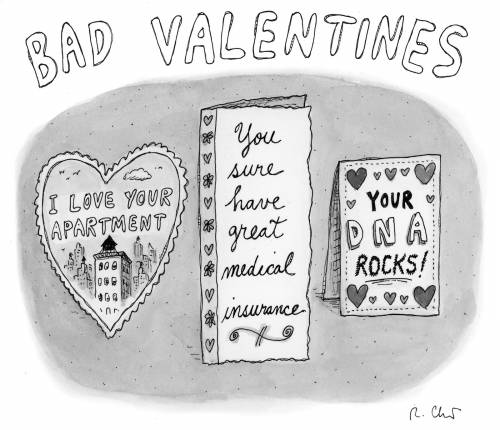
It is somewhat ironic that Bourdain has emerged as an ambassador for the culinary profession, given that, by his own admission, he was never an inspired chef. Alan Richman, the restaurant critic at GQ, who is a champion of white-tablecloth haute cuisine, told me that Les Halles “was not a particularly good restaurant when he was cooking there, and it got worse when he stopped.” This seemed a little unfair: I frequented Les Halles before it closed, in 2016, and until the end it was rowdy and reliable, with a good frisée salad and a sturdy cassoulet. But it was never a standout restaurant. Bourdain used to genuflect like a fanboy before innovative chefs such as Éric Ripert, of Le Bernardin. On page 5 of “Kitchen Confidential,” he joked that Ripert, whom he had never met, “won’t be calling me for ideas on today’s fish special.” After the book came out, Bourdain was in the kitchen at Les Halles one day, when he got a phone call. It was Ripert, inviting him to lunch. Today, they are best friends, and Ripert often plays the straight man to Bourdain on “Parts Unknown.” A recent episode in Chengdu, China, consisted largely of shots of a flushed and sweaty Ripert being subjected to one lethally spicy dish after another while Bourdain discoursed on the “mouth-numbing” properties of Sichuan pepper and took jocular satisfaction in his friend’s discomfort.
Ripert said of Bourdain, “I have cooked side by side with him. He has the speed. He has the precision. He has the skill. He has the flavor. The food tastes good.” He hesitated. “Creativity-wise . . . I don’t know.” Over the years, Bourdain has regularly been approached about opening his own restaurant, and these offers might have yielded him a fortune. But he has always declined, mindful, perhaps, that his renown as a bard of the kitchen might be difficult to equal in the kitchen itself.
Even so, everywhere Bourdain goes young cooks greet him as “Chef.” When I asked him if that felt strange, he bristled slightly. “Look, I put in my time, so I’m not uncomfortable with it,” he said. “What makes me uncomfortable is when an actual working chef who cooks better than I’ve ever cooked in my life calls me Chef.” As if on cue, Deuki Hong—who, before opening Baekjeong, worked under Jean-Georges Vongerichten and David Chang—appeared with a platter of steamed sweet potatoes, and addressed Bourdain as Chef.
Halfway through the meal, we were joined by Stephen Werther, a bespectacled entrepreneur who is Bourdain’s partner in a new venture: a Manhattan market modelled on Singapore’s hawker centers, or open-air food courts. It is scheduled to open, sometime in the next few years, at Pier 57, a cavernous former shipping terminal on the West Side. If Bourdain’s show offers a vicarious taste of an intrepid culinary expedition, the market will provide an ersatz consumer experience of his show. The best street-food venders will be recruited from around the world and awarded visas—assuming that the United States is still issuing them—allowing New Yorkers to sample their octopus tostadas and their yakitori chicken hearts. Bourdain Market, as it will be known, is a preposterously ambitious venture; it will be three times the size of the original Eataly—Mario Batali’s super-emporium of Italian food in the Flatiron district. Werther was accompanied by Robin Standefer and Stephen Alesch, a married couple who run Roman and Williams, a design firm that creates seductive contemporary spaces, such as the Ace Hotel in New York. They had agreed to work on the market. Their background is in Hollywood set design, an ideal match for Bourdain’s sensibility.
“Imagine a post-apocalyptic Grand Central Terminal, if it had been invaded by China,” Bourdain said.
“But underwater,” Standefer joked.
Bourdain elaborated that the market should bring to mind “Blade Runner”—high-end retail as grungy, polyglot dystopia. When Bourdain was growing up, his father used to rent a 16-mm. projector and show movies by Stanley Kubrick and Mel Brooks. “I’ve never met anyone who has this catalogue of films in his head,” one of his longtime cameramen, Zach Zamboni, told me. A Rome episode of “No Reservations” made black-and-white allusion to Fellini. The Buenos Aires episode on “Parts Unknown” was a nod to “Happy Together,” by Wong Kar-wai. Most viewers are unlikely to catch such references, but for Bourdain that is not the point. “When other cinematographers like it, that feels good,” he said. “It’s just like cooking—when the other cooks say, ‘Nice plate.’ It’s kind of not about the customers.” The producer Lydia Tenaglia, who, along with her husband, Chris Collins, recruited Bourdain to television for “A Cook’s Tour,” and now runs Zero Point Zero, told me that part of the reason Bourdain’s experience is so often refracted through films is that, until middle age, he had seen so little of the world. “Books and films, that was what he knew—what he had read in Graham Greene, what he had seen in ‘Apocalypse Now.’ ”
Singapore’s orderly hawker markets combine the delights of roadside gastronomy with an approach to public-health regulation that could pass muster in post-Bloomberg New York. “They cracked the code without losing this amazing culture,” Bourdain said. Some of his partners in the market will be established restaurateurs, like April Bloomfield, the Michelin-starred chef of the Spotted Pig and the Breslin. But Bourdain also wants the market to have an old-fashioned butcher shop, with “guys in bloody aprons breaking down sections of meat,” and Asian street food that will attract not just the Eater-reading cognoscenti but also displaced Asians in New York who yearn for a genuine taste of home. “If the younger Korean hipsters and their grandparents like us, we’re gonna be O.K.,” he said.
I wondered aloud if grilled heart could turn a profit in New York. Wouldn’t the adventurous offerings be loss leaders, while more conventional attractions, like an oyster bar, paid the rent?
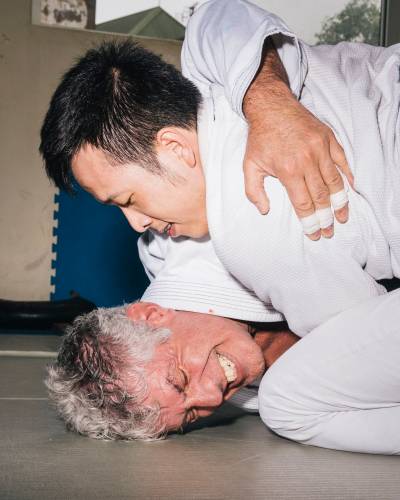
Now that Bourdain trains nearly every day in jujitsu, he tries to eat and drink more selectively. “Off camera, I don’t go around getting drunk at night,” he said.
“I’m an optimist,” Bourdain replied. Tastes evolve, he insisted. Exposure to foreign cultures makes inhibitions fall away. “I grew up watching ‘Barney Miller,’ and it was Asian jokes all day long. They made fun of Asian food. It smelled like garbage. That’s not funny anymore.” With his chopsticks, he gestured toward a bowl of kimchi between us. “Americans want kimchi. They want it on their hamburgers. It’s like when Americans started eating sushi—a huge tectonic shift.” The new frontier for American tastes is fermentation, Bourdain continued. “That funk. That corruption of the flesh. That’s exactly the flavor zone that we’re all moving toward.”
“This is the secret of the food world,” Stephen Werther said. “Rot is delicious. No one will ever say that to your face. Aged steaks. ‘Age’ is code for ‘rot.’ ”
“Cured,” Bourdain said, warming to the riff.
“Alcohol is the by-product of yeast,” Stephen Alesch chimed in. “It’s the piss of yeast.”
“Basically, what we’re saying is that filth is good,” Bourdain concluded.
Deuki Hong reappeared with a plate of marbled rib eye. “Korean restaurants don’t usually dry-age,” he said. “But we’re trying dry-aged. This is, like, thirty-eight days.”
“You see? The rot!” Werther exclaimed. “What happens after thirty-eight days?”
“Good things,” Bourdain said.
“For Valentine’s Day once, we made a stew by cooking this big beef heart,” Alesch said.
“That’s very romantic,” Werther observed.
“It was,” Alesch said. “We ate it for, like, four days.”
We left the restaurant, with Hong in tow, and had a round of soju bombs at an unmarked bar on the third floor of a nearby office building. Our little party then proceeded to a Korean night club on Forty-first Street. A vast warren of karaoke rooms surrounded a central dance floor, where flickering lasers illuminated a crowd that was young, prosperous-looking, and entirely Asian. In a V.I.P. room overlooking the dance floor, Bourdain quizzed one of the owners, Bobby Kwak, a young Korean-American man in a black T-shirt, about the clientele. “If they go to a downtown club like Marquee, they stick out like a sore thumb,” Kwak explained, shouting over thudding techno. He pointed at Bourdain. “You’re the minority here.”
Bourdain said that this was exactly the kind of crowd he wanted to attract to the market. He had no interest in catering to “the gringos.” Instead, he wanted to teach the gringos that they could love a place that was legitimate enough to be popular with a crowd like this.
“It’s going to be hard,” Kwak said. “You’ll get the Asian-Americans . . . ”
Bourdain insisted that he also wanted the young Koreans who had grown up in Seoul, not Fort Lee. It was nearly 2 A.M. “So, after they get out of here, where do they go?” Bourdain asked.
Kwak laughed, and shouted, “They go right to where you just ate.”
In the summer of 2006, Bourdain flew to Lebanon to make a “No Reservations” episode about Beirut. He planned to focus on the city’s cosmopolitan night life, nibbling kibbe, drinking arrack, and taking in the vibe at beachside night clubs. In the episode, he explains in a voice-over, “Everyone’s been through here—the Greeks, the Romans, the Phoenicians. So I knew this was going to be a great place to eat.” But, while Bourdain was strolling down the street one day, a convoy of vehicles rolled by, flying the yellow flags of Hezbollah. They were celebrating an ambush in which Hezbollah forces had crossed into Israel, killing three Israeli soldiers and capturing two others. The next day, Israel launched missiles at Beirut, killing dozens of civilians. Bourdain and his crew ended up at the Royal Hotel, on a hilltop not far from the U.S. Embassy, playing cards while they waited to be evacuated. In a surreal accident of geography, they could watch the war unfold from the relative safety of the hotel pool.
All travel requires a degree of improvisation, and Bourdain and his cameramen are well versed in reconceiving a show on the fly. Once, when he was snorkeling off the coast of Sicily, in search of seafood, he was startled to see a half-frozen octopus splash into the water beside him. His host, a deeply tanned, eager-to-please Sicilian, was dropping fish onto the seabed for him to “discover” on camera. Naturally, this violated Bourdain’s dogma of verité. He was outraged, but decided to incorporate the moment into the episode, to hilarious effect. (“I’m no marine biologist, but I know a dead octopus when I see one.”)
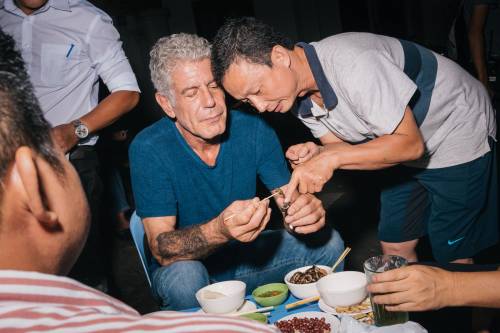
“I don’t know anybody who is more a man of the twenty-first century,” Alan Richman, the food critic, says of Bourdain. “The way he acts. The way he speaks. His insanity. His vulgarity.”
In Beirut, there was no way to edit around the war. But Bourdain and his producers felt that they had a story to tell, and they put together a show about being stranded by the conflict. In the episode, viewers see Bourdain’s cameramen worrying about getting home, and the local fixers and producers worrying about the safety of loved ones. At one point in the narration, Bourdain says, “This is not the show we went to Lebanon to get.” Until he travelled to Beirut, wherever he had ventured, no matter how bleak, he had always ended the episode with a voice-over that was, if not upbeat, at least hopeful. At the conclusion of the Beirut episode, he said, “Look at us in these scenes. . . . We’re sitting around in bathing suits, getting tanned, watching a war. If there’s a single metaphor in this entire experience, you know, that’s probably it.” Darren Aronofsky describes Bourdain’s show as a form of “personal journalism,” in the tradition of Ross McElwee’s 1985 documentary, “Sherman’s March,” in which a story is pointedly filtered through the individual experience of the filmmaker. In Beirut, at a beach where a line of people stood clutching their belongings, Bourdain and his crew were ushered by U.S. Marines onto a crowded American warship.
At the time, Bourdain was in a new relationship. Éric Ripert had recently set him up with a young Italian woman named Ottavia Busia, who was a hostess at one of Ripert’s restaurants. She and Bourdain both worked incessantly, but Ripert figured that they might find time to enjoy a one-night stand. On their second date, Busia and Bourdain got matching tattoos of a chef’s knife. Eight months later, Bourdain returned, shaken, from Beirut, and they talked about having children. “Let’s spin the wheel,” Busia told him, adding, dubiously, “Your sperm is old, anyway.” Their daughter, Ariane, was born in April, 2007, and they were married eleven days later.
Busia is also a jujitsu fanatic, and, when I contacted her, she suggested that we meet at the school where she and Bourdain train, not far from Penn Station. “I’m here every day,” she said. Busia is thirty-eight, with big brown eyes, a warm, toothy grin, and the dense, bunched-up shoulders of a gym rat. She sat cross-legged on a mat, wearing a black T-shirt that said, “In Jujitsu We Trust,” and leggings that were decorated with cat faces. Busia first tried martial arts after giving birth, hoping to lose some weight, but she soon became consumed by jujitsu, and induced Bourdain to take a private lesson. (She bribed him, she maintains, with a Vicodin.) “I knew he was going to like the problem-solving aspect of it,” she told me. “It’s a very intellectual sport.”
Years ago, while filming an episode in Rajasthan, Bourdain met a fortune-teller who told him that one day he would become a father. “That guy’s full of fucking shit,” Bourdain told one of the producers afterward. “I would be a horrible father.” But Ariane is, by her parents’ accounts, a well-adjusted kid. For a time, Busia brought her along on some of Bourdain’s journeys, but when Ariane started elementary school that became impractical. Once, Busia was startled awake in the middle of the night with the horrifying realization that a strange man was in her bed. Then she rolled over and remembered that it was just Tony; she had forgotten that he was home. (Last year, Bourdain spent only about twenty weeks in New York.) Now that Busia is in peak physical condition, she is hoping to climb Mt. Everest. Last summer, Bourdain told me that she was sleeping in a hypoxia chamber—a device that mimics the oxygen depletion of high altitudes. “It basically re-creates thirty-two thousand feet,” he said, then shrugged. “Anyway, nobody’s sitting at home waiting for me to define them.”
When I asked about fatherhood, Bourdain grew reflective. “I’m shocked by how happy my daughter is,” he said. “I don’t think I’m deluding myself. I know I’m a loving father.” He paused. “Do I wish sometimes that, in an alternative universe, I could be the patriarch, always there? Tons of kids? Grandkids running around? Yes. And it looks good to me. But I’m pretty sure I’m incapable of it.”
Perhaps the most beautiful thing that Bourdain has written is a 2010 essay called “My Aim Is True,” which is a profile of Justo Thomas, a fastidious middle-aged man from the Dominican Republic, who descends early each morning to the basement beneath Le Bernardin, where he prepares a series of sharp knives, and then, with the precision of a heart surgeon, disassembles seven hundred pounds of fresh fish. The fish come to the restaurant, Thomas says, “the way they catch,” which, Bourdain explains, means whole, straight from the ocean—“shiny, clear-eyed, pink-gilled, still stiff with rigor, and smelling of nothing but seawater.” It is Thomas’s job to break each carcass down into delicate cuts that will be served upstairs, and the essay is a warm tribute to him and to the details of his largely invisible craft. (“The walls, curiously, have been carefully covered with fresh plastic cling wrap—like a serial killer would prepare his basement—to catch flying fish scales and for faster, easier cleanup.”) By the time Thomas completes his shift, it is noon, and Bourdain invites him to have lunch in the dining room. In six years of working at Le Bernardin, Thomas has never eaten there as a guest. Bourdain gestures toward the patrons around them, and notes that some of them will spend on a bottle of wine what Thomas might make in a couple of months. “I think in life they give too much to some people and nothing to everybody else,” Thomas tells him. But, he adds, “without work, we are nothing.”
In Bourdain’s estimation, writing is a less gruelling art than cooking. “I think I’ve always looked at everybody I met through the prism of the kitchen,” he told me at one point. “ ‘O.K., you wrote a good book, but can you handle a brunch shift?’ ” Writing is ephemeral, he said. More ephemeral than brunch? I asked. “Three hundred brunches, nothing came back,” he said, his voice hardening with the steely conviction of a combat veteran. “Three hundred eggs Benedict. Not one returned. It’s mechanical precision. Endurance. Character. That’s real.”
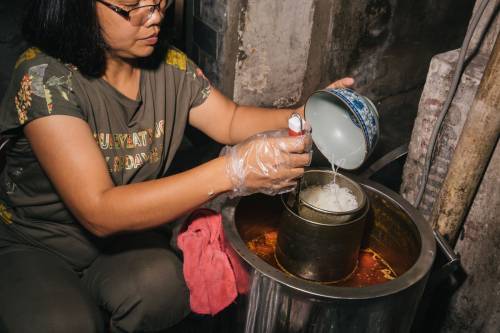
Bourdain has eaten some appalling things—bear bile in Vietnam, bull’s-penis soup in Malaysia, the unwashed rectum of a warthog in Namibia—but he is careful to distance himself from any suggestion that he trucks in gag-reflex entertainment.
When Bourdain tells his own story, he often makes it sound as if literary success were something that he stumbled into; in fact, he spent years trying to write his way out of the kitchen. In 1985, he began sending unsolicited manuscripts to Joel Rose, who was then editing a downtown literary journal, Between C & D. “To put it to you quite simply, my lust for print knows no bounds,” Bourdain wrote, in the cover letter for a submission of cartoons and short stories, noting, “Though I do not reside on the Lower East, I have in the recent past enjoyed an intimate though debilitating familiarity with its points of interest.” Rose eventually published a story by Bourdain, about a young chef who tries to score heroin but is turned away, because he has no fresh track marks. (“There’s tracks there! They just old is all cause I been on the program!”)
Bourdain bought his first bag of heroin on Rivington Street in 1980, and plunged into addiction with his usual gusto. “When I started getting symptoms of withdrawal, I was proud of myself,” he told me. Addiction, like the kitchen, was a marginal subculture with its own rules and aesthetics. For Bourdain, an admirer of William S. Burroughs, heroin held a special allure. In 1980, he says, he copped every day. But eventually he grew disenchanted with the addict’s life, because he hated being at the mercy of others. “Getting ripped off, running from the cops,” he recalled. “I’m a vain person. I didn’t like what I saw in the mirror.” Bourdain ended up on methadone, but he resented the indignities of the regimen: being unable to leave town without permission, waiting in line to pee in a cup. He quit cold turkey, around 1987, but spent several more years addicted to cocaine. “I just bottomed out on crack,” he recalled. Occasionally, between fixes, he would find himself digging paint chips out of the carpet in his apartment and smoking them, on the off chance that they were pebbles of crack. Things grew so bad that Bourdain recalls once sitting on a blanket on Broadway at Christmastime, with his beloved record collection laid out for sale.
Given Bourdain’s braggadocio, there were times when I wondered if the bad years were quite as grim as he makes them sound. “There are romantics, and then there are the hard-core addicts,” Karen Rinaldi said. “I think Tony was more of a romantic.” Nancy Putkoski told me in an e-mail that Tony is “pretty dramatic.” She wrote, “It does look pretty bleak in the rearview mirror. But, when you’re living it, it’s just your life. You struggle through.” Once, Bourdain was riding in a taxi with three friends, having just scored heroin on the Lower East Side. He announced that he had recently read an article about the statistical likelihood of getting off drugs. “Only one in four has a chance at making it,” he said. An awkward silence ensued. Years later, in “Kitchen Confidential,” Bourdain pointed out that he made it and his friends had not. “I was the guy.”
In 1985, Bourdain signed up for a writing workshop led by the editor Gordon Lish. “He took it very seriously,” Putkoski told me. In letters to Joel Rose, Bourdain referred to the workshop as a transformative experience, and talked about “life after Lish.” (When I reached Lish by phone, he recalled Bourdain as “an altogether charming fellow, very tall,” but he had no recollection of Bourdain’s writing.)
After getting clean, around 1990, Bourdain met an editor at Random House, who gave him a small advance to write a crime novel set in the restaurant world. Writing had always come easily to Bourdain; at Vassar, he wrote term papers for classmates in exchange for drugs. He didn’t agonize over the novel, he said: “I didn’t have time.” Every day, he rose before dawn and banged out a new passage at his computer, chain-smoking, then worked a twelve-hour restaurant shift. The novel, “Bone in the Throat,” was published in 1995. (“Two-hundred-and-eighty-pound Salvatore Pitera, in a powder-blue jogging suit and tinted aviator glasses, stepped out of Franks Original Pizza onto Spring Street. He had a slice of pizza in one hand, too hot to eat.”) Bourdain paid for his own book tour, and recalls sitting behind a table at a Barnes & Noble in Northridge, California, with a stack of his books, as people walked by, avoiding eye contact. That novel and a follow-up, “Gone Bamboo,” quickly went out of print. (They have since been reissued.)
In 1998, Les Halles opened a Tokyo branch, and one of the owners, Philippe Lajaunie, asked Bourdain to spend a week there, mentoring the staff. Bourdain fretted over how he’d survive the thirteen-hour flight without a cigarette, but once he landed in Tokyo he was exhilarated. “This place is like ‘Blade Runner,’ ” he wrote to Joel Rose, in an e-mail. “I’m speaking French, hearing Japanese, and thinking English all while still horribly jet-lagged, crazed on iced sushi, jacked up on fugu, and just fucking dazzled by it all.” He described the thrill of walking into the most uninviting, foreign-seeming, crowded restaurant he could find, pointing at a diner who appeared to have ordered something good, and saying, “Gimme that!”
Rose had recently had a child with Rinaldi, the book editor. He showed her the e-mails, and Rinaldi was impressed by Bourdain’s bawdy vernacular. “Do you think he has a book in him?” she asked.
“You have no idea,” Rose said.
Writing may have long been part of Bourdain’s plan, but TV, according to Putkoski, “was never really in the picture until it was offered.” Shortly after “Kitchen Confidential” was published, Lydia Tenaglia and Chris Collins started talking with Bourdain about making a show. He told them that he was planning a follow-up book in which he travelled around the world, eating. If they wanted to pay to follow him with cameras, why not?
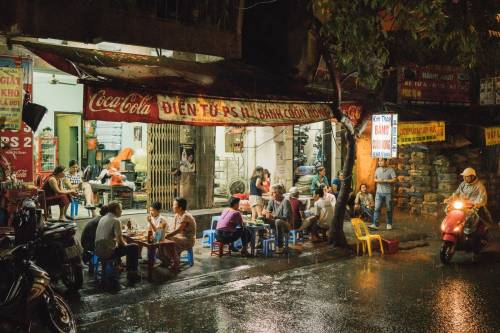
When he meets someone at a roadside café, he wears a lavalier microphone, which picks up the sort of ambient noise that sound designers normally filter out.
Putkoski was less enthused. “She identified television early on as an existential threat to the marriage,” Bourdain said. “I felt like the whole world was opening up to me. I’d seen things. I’d smelled things. I desperately wanted more. And she saw the whole thing as a cancer.” If you watch episodes of “A Cook’s Tour,” you can sometimes spot Putkoski hovering at the edge of the frame. She had no desire to be on camera. She told me recently that her ideal degree of fame would be that of a Supreme Court Justice: “Almost nobody knows what you look like, but you always get the reservation you want.”
For a time, Bourdain tried to save the marriage. He remodelled their apartment with the extra money he was making. But it didn’t work. “I was ambitious, she was not,” he said. “I have a rampaging curiosity about things, and she was content, I think, to be with me. To go to the Caribbean once a year. There were things that I wanted, and I was willing to really hurt somebody to have them.” Bourdain describes his separation from Putkoski as “the great betrayal” of his life.
In an e-mail, Putkoski wrote to me, “I’m big on shared experiences, which I’d thought had bulletproofed our partnership. . . . We’d been through an awful lot of stuff together, a lot of it not so great, a lot of it wonderful fun.” She concluded, “I just didn’t anticipate how tricky success would be.”
Outside the beer hall in Hanoi, under a tree festooned with Christmas lights, a stout elderly woman in billowy striped pants presided, with a cleaver, over a little stand that served roasted dog. Bourdain was relaxing nearby with Dinh Hoang Linh, a sweet-tempered Vietnamese bureaucrat who has been a close friend of his since 2000, when Linh was Bourdain’s government minder on his first trip to Hanoi. Over the years, the recipe for Bourdain’s show has subtly changed. When he first went to Asia, he joked that he was going to eat “monkey brains and poisonous blowfish gizzards.” At a restaurant in Vietnam called Flavors of the Forest, he was treated to a delicacy in which the proprietor grabs a writhing cobra, unzips its belly with a pair of scissors, yanks out its still beating heart, and drops it into a small ceramic bowl. “Cheers,” Bourdain said, before knocking it back like an oyster. If, in subsequent seasons, Bourdain has eaten some other appalling things—bear bile in Vietnam, bull’s-penis soup in Malaysia, the unwashed rectum of a warthog in Namibia—he is careful to distance himself from any suggestion that he trucks in gag-reflex entertainment. When he was getting started, a degree of sensationalism was “exactly the cost of doing business,” he told me, adding, “I’m not going to sneer at it. Whatever gets you across the river.” (He noted, diplomatically, that the Travel Channel currently has a show, “Bizarre Foods,” devoted to that kind of thing.)
He has never eaten dog. When I pointed out the dog-hawker in our midst, he said, “I’m not doing it just because it’s there anymore.” Now, when he’s presented with such offerings, his first question is whether it is a regular feature of the culture. “Had I found myself as the unwitting guest of honor in a farmhouse on the Mekong Delta where a family, unbeknownst to me, has prepared their very best, and I’m the guest of honor, and all of the neighbors are watching . . . I’m going to eat the fucking dog,” he said. “On the hierarchy of offenses, offending my host—often a very poor one, who is giving me the very best, and for whom face is very important in the community—for me to refuse would be embarrassing. So I will eat the dog.”
Bourdain has softened in other ways. Although he still baits the food press with a steady stream of headline-ready provocations—“Anthony Bourdain: Airplane Food and Room Service Are Crimes”; “Anthony Bourdain Wishes Death Upon the Pumpkin-Spice Craze”; “Anthony Bourdain on Dining with Trump: Absolutely F*cking Not”—he often makes peace with people to whom he has taken a blowtorch in the past. In “Kitchen Confidential,” he relentlessly pilloried the TV chef Emeril Lagasse, noting several times his resemblance to an Ewok. Then they met, Bourdain ate Lagasse’s food, and eventually he took it all back and apologized. Lajaunie, the former Les Halles owner, said of Bourdain, “He’s extremely kind, but it’s the genuine kindness that comes from deep cynicism.” Lajaunie went on, “He has accepted that everyone has broken springs here and there. That’s what most of us lack—the acceptance that others are as broken as we are.” After Bourdain read “How to Live,” Sarah Bakewell’s 2010 book about Michel de Montaigne, he got a tattoo on his forearm of Montaigne’s motto, in ancient Greek: “I suspend judgment.”
Even Alan Richman, the GQ critic, whose snobbery Bourdain once savaged in an essay entitled “Alan Richman Is a Douchebag,” has become a sort of friend. When Bourdain was writing for “Treme,” he concocted a scene in which a character named Alan Richman visits a restaurant in New Orleans and has a Sazerac thrown in his face. He invited Richman to play himself, and Richman did.
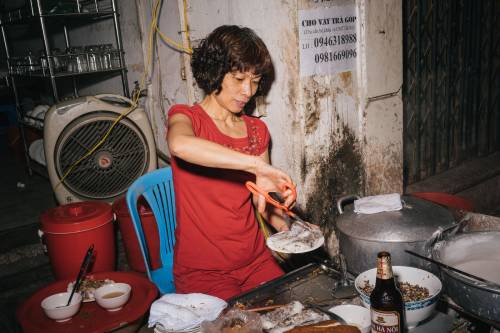
Bourdain is exceptionally close to his crew members, in part because they are steady companions in a life that is otherwise transient. “I change location every two weeks,” he told me. “I’m not going to remember your birthday.”
In an era of fast-casual dining, Richman pointed out, the “roughneck” cuisine that Bourdain celebrates has enormous appeal. Bourdain has helped create the circumstances in which one of the most widely praised restaurants in New York City is the Spotted Pig, April Bloomfield’s West Village gastropub, which is known for its unfussy cheeseburgers. To the degree that one can extrapolate from the personal quarrel between Richman and Bourdain a larger philosophical debate about the proper future of American tastes, Richman readily concedes defeat. “I don’t know anybody who is more a man of the twenty-first century,” Richman told me. “The way he acts. The way he speaks. His insanity. His vulgarity.”
As “Parts Unknown” has evolved, it has become less preoccupied with food and more concerned with the sociology and geopolitics of the places Bourdain visits. Lydia Tenaglia calls the show an “anthropological enterprise.” Increasingly, Chris Collins told me, the mandate is: “Don’t tell me what you ate. Tell me who you ate with.” Bourdain, in turn, has pushed for less footage of him eating and more “B roll” of daily life in the countries he visits. It has become a mantra for him, Collins said: “More ‘B,’ less me.”
Since visiting Beirut, Bourdain has gone on to Libya, Gaza, and the Democratic Republic of Congo, seeking to capture how people go about their daily lives amid violent conflict. To viewers who complain that the show has become too focussed on politics, Bourdain responds that food is politics: most cuisines reflect an amalgamation of influences and tell a story of migration and conquest, each flavor representing a sedimentary layer of history. He also points out that most shows about food are premised on a level of abundance that is unfamiliar in many parts of the world.
The program’s shift in tone coincided, fortuitously, with the move to CNN. In 2012, the network was struggling with a dilemma that is common to cable news. “Big events happen in the world and viewers flock to you in droves, and as soon as the event is over they disappear,” Amy Entelis, an executive vice-president at CNN, told me. The network wanted to create “appointment viewing”: original shows that audiences would seek out week after week. “Tony’s name came up right away,” Entelis said. It has been a happy arrangement: the network gives Bourdain ample resources and near-total creative freedom. “I’ve never gotten the stupid phone call,” he said. The show has been a ratings success, and it has won five Emmys and a Peabody Award. Eerily, one of the highest-rated episodes of “Parts Unknown” aired soon after the 2013 Boston Marathon bombing. It was an episode about Los Angeles, which Bourdain had shot exclusively in Koreatown, and it’s great, but nobody believes that this accounts for the ratings. Millions of people had followed the manhunt, and the devastating aftermath of the attack, on CNN. By Sunday, they needed a break.
Bourdain is comfortable being seen as a purveyor of escapism; he is less comfortable with the responsibility that attends the show’s more serious material. In an episode set in Laos, he ate freshwater fish and bamboo shoots with a man who had lost an arm and a leg when a U.S. explosive, left over from the war, detonated. In Hanoi, one of Obama’s staffers told him that, until the episode aired, some people in the White House had been unaware of the extent of the unexploded-ordnance problem in Laos. “Very casually, he said, ‘So I guess you do some good after all,’ ” Bourdain recalled. “I’m a little embarrassed. I feel like Bono. I don’t want to be that guy. The show is always about me. I would be bullshitting you if I said I was on some mission. I’m not.”
Nevertheless, Bourdain knows that most viewers who caught his Congo episode had read little about the conflicts there. I was reminded of how Jon Stewart, whenever someone observed that many young people got their news from “The Daily Show,” protested, unpersuasively, that he was just a comedian cracking jokes. Bourdain’s publisher, Dan Halpern, said, “Whether he likes it or not, he’s become a statesman.”
Bourdain insists that this is not the case. “I’m not going to the White House Correspondents’ dinner,” he said. “I don’t need to be laughing it up with Henry Kissinger.” He then launched into a tirade about how it sickens him, having travelled in Southeast Asia, to see Kissinger embraced by the power-lunch crowd. “Any journalist who has ever been polite to Henry Kissinger, you know, fuck that person,” he said, his indignation rising. “I’m a big believer in moral gray areas, but, when it comes to that guy, in my view he should not be able to eat at a restaurant in New York.”
I pointed out that Bourdain had made similarly categorical denunciations of many people, only to bury the hatchet and join them for dinner.
“Emeril didn’t bomb Cambodia!” he said.
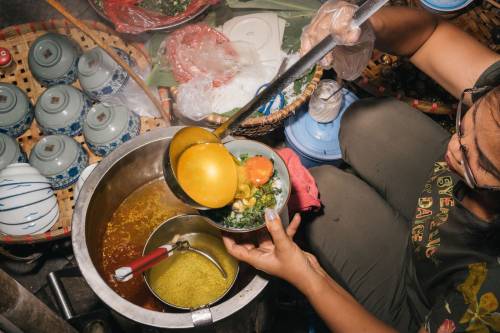
Guiding President Obama through a meal, Bourdain declared, “Slurping is totally acceptable in this part of the world.”
One morning in August, I got an e-mail from Bourdain letting me know that he and Busia were separating. “It’s not much of a change of life style, as we have lived separate lives for many years,” he wrote. “More of a change of address.” Bourdain felt some relief, he told me: he and Busia no longer needed to “pretend.” In our conversations up to that point, he had celebrated the fact that Busia pursued jujitsu and her other interests in the same headlong manner in which he pursued his. But in the e-mail he wrote, “She’s an interesting woman. I admire her choices. But I married Sophia Loren. She turned into Jean-Claude Van Damme.” (I learned subsequently that this was a standing joke between Bourdain and Busia, and not intended harshly.) Bourdain added that he was about to promote a new “family cookbook,” called “Appetites,” which would “lead to some awkward interviews.”
Chris Bourdain told me that, when Anthony first became famous, his attitude was: “I have no idea how long this is going to go on, so I want to max it out while I can.” Whenever a new opportunity presented itself, he said yes. By the time Bourdain met Busia, he had achieved a level of recognition and wealth that might have enabled him to slow down. But he didn’t stop moving. “Parts Unknown” films two seasons a year. Even first-class travel can be punishing after a while, and Bourdain acknowledges that although he may still behave like a young man, he isn’t one. “I think you’re officially old at sixty, right?” he told me, soon after his birthday. “The car starts falling apart.” However, TV stars forge bonds with their audience through habitual exposure, and it can feel risky to take a break. “It’s a bit like ‘Poltergeist,’ ” Nigella Lawson, who was Bourdain’s co-host on “The Taste,” told me. “You get sucked into the TV and you can never get out.”
At this point, Éric Ripert observed, Bourdain’s show has “done the entire planet already!” Now, Bourdain says, the pleasure of making “Parts Unknown” lies in revisiting places to see how they’ve changed—Cuba five years ago is a different country from Cuba today—or in returning to a place with a fresh perspective. For a recent episode on Houston, Bourdain decided that he wanted “no white people,” and provided instead a look at the city “as a Vietnamese and Central American and African and Indian place.” Chris Collins suggested to me that the perpetual discontinuity of Bourdain’s life may have assumed a continuity of its own, as if jet lag were his natural condition. “I’ve often thought, How would he ever go on without the show?” Lydia Tenaglia said. “It is such an inextricable part of him—who is Tony, apart from this?”
For years, Bourdain has had a recurring dream in which he finds himself in a Victorian-era hotel, wandering through well-appointed hallways, unable to find the front desk. A year ago, when I asked him how long he would stick with the show, he said, “Until it’s not fun.” In September, I posed the same question at a sushi restaurant in Manhattan, and this time he was more contemplative. “I have the best job in the world,” he said. “If I’m unhappy, it’s a failure of imagination.” He was delighted with the Vietnam episode, which was about to air. CNN had wanted to lead with the Obama meeting, but Bourdain, ever one to play it casual, waited until nearly forty minutes into the episode to introduce the President. He got the James Brown song he wanted. (“I may have fibbed and told the network that I promised the President personally that we would get that for his walk-on music.”)
After the Vietnam trip, Bourdain had competed in a jujitsu tournament, in Manhattan, and had been defeated by a strongman who wrenched his head with such ferocity that he thought his fillings might pop. As an added indignity, Bourdain came away from the tournament with a skin infection that left him looking, he says, “like Quasimodo.” (Ripert is puzzled by jujitsu: “It’s supposed to be good for the body, but he seems to be in pain all the time.”)
In a fit of self-exile, Bourdain flew to France and made his way, alone, to the oyster village that he had visited as a child. He had rented a big villa, with the intention of doing some writing. Bourdain cherishes the trope of the misanthropic émigré. “To me, ‘The Quiet American’ was a happy book, because Fowler ends up in Vietnam, smoking opium with a beautiful Vietnamese girl who may not have loved him,” he told me.
But in France he found that he couldn’t write. His body was itchy and swollen from the rash, and he had a throbbing pain in his head. Because he looked hideous, he left the villa only after dark, like a vampire. Finally, Bourdain sought out a French doctor, who gave him a battery of painkillers and anti-inflammatories. After impulsively swallowing a week’s supply, Bourdain realized that he had not eaten in thirty-six hours. He drove to a café in a nearby town, Arcachon, and ordered spaghetti and a bottle of Chianti. He was halfway through the wine when he realized that he was sweating through his clothes. Then he blacked out.
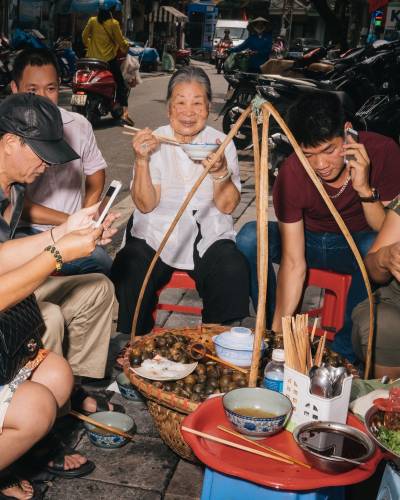
Bourdain is an evangelist for street food, and Hanoi excels at open-air cooking.
When he woke up, Bourdain was lying with his feet in the café and his head in the street. A waiter was rifling through his pockets, in search of a driver’s license, as if to identify a corpse. Bourdain’s father had died suddenly, at fifty-seven, from a stroke, and Bourdain often thinks about dying; more than once, he told me that, if he got “a bad chest X-ray,” he would happily renew his acquaintance with heroin. Taking meds and booze on an empty stomach was just a foolish mistake, but it left him shaken. He stood up, reassured the startled onlookers, drove back to the villa, and immediately wrote a long e-mail to Nancy Putkoski.
When I asked him what he wrote, Bourdain paused and said, “The sort of thing you write if you, you know, thought you were going to die. ‘I’m fucking sorry. I’m sure I’ve acted like I wasn’t.’ We’ve had very little contact—you know, civil, but very, very little. ‘I’m sorry. I know that doesn’t help. It won’t fix it, there’s no making amends. But it’s not like I don’t remember. It’s not like I don’t know what I’ve done.’ ”
Anthropologists like to say that to observe a culture is usually, in some small way, to change it. A similar dictum holds true for Bourdain’s show. Whenever Bourdain discovers a hole-in-the-wall culinary gem, he places it on the tourist map, thereby leaching it of the authenticity that drew him to it in the first place. “It’s a gloriously doomed enterprise,” he acknowledged. “I’m in the business of finding great places, and then we fuck them up.”
For the restaurant that welcomes Bourdain and his crew, there are conspicuous upsides to this phenomenon. Our food at the sushi place was middling; Bourdain avoided the fish and ordered chicken katsu, most of which he left uneaten. As we were leaving, Bourdain amiably obliged the owner’s request for a selfie, and I witnessed a comically subtle tango, as she maneuvered his body so that the photo would capture the restaurant’s sign (creating an implicit endorsement) and Bourdain gently swivelled her the other way, so that the backdrop would be Third Avenue instead.
In Hanoi, a few days after Bourdain’s dinner with Obama, I mentioned that I was going to swing by the Bún-chả restaurant. As if recalling a bygone establishment, Bourdain murmured dreamily, “I wonder what it’s like now.”
I chuckled at this, but when I visited the next day the restaurant had indeed changed. A sign outside said, in Vietnamese, “We have no more bún chả!,” and gawkers loitered around the entrance. In the kitchen, the woman who runs the restaurant, Nguyên Thi Liên, was smiling, perspiring, and clearly overwhelmed. Her family had owned the place for decades. She told me that Hanoi kids had been stopping by at night, long past closing, to have their picture taken.
One evening in Vietnam, Bourdain finished a shoot outside a noodle shop, and loped over to the other side of the street, where I was sitting. “Want to go for a ride?” he asked. The crew had rented him a blue Vespa, and Bourdain told me that the only way to see Hanoi was on the back of a scooter: “To be anonymous, another helmeted figure in the middle of a million little dramas and comedies happening on a million bikes moving through this amazing city—every second is pure joy.” I climbed on behind him. “I’ve only got one helmet,” he said, handing it to me. I had scarcely strapped it on when he hit the gas and we were swept up in a surging river of vehicles. “I love this!” he shouted over his shoulder, picking up speed. “The smells! The traffic!” We shot through a perfumed cloud of smoke from a cookfire. Bourdain swerved to avoid an oncoming truck, and almost hit a woman on a scooter with a bale of green vegetables balanced precariously on the back. As we veered into a gutter, without breaking speed, it occurred to me that this would, at any rate, be a memorable way to die. Bourdain slowed down to ask a pedestrian for directions, and the man indicated that, to reach the Metropole Hotel, we should hang a left around Hoàn Kiếm Lake. But when we reached the lake—a tree-lined oasis with a tiny island in the center—Bourdain said, “Let’s go this way,” and turned right. Clutching my seat as we zoomed into another congested avenue, I realized that Bourdain had deliberately taken a wrong turn. He was courting uncertainty, trying to get lost.
The next morning, I met Bourdain in the lobby of the Metropole, and we drove to the outskirts of the city. He can hit the ground anywhere in the world, from Kathmandu to Kiev, and find a gym where people train in Brazilian jujitsu. “Everywhere you go, the etiquette is the same,” he said. “We bump fists, then we try to kill each other for five minutes.”
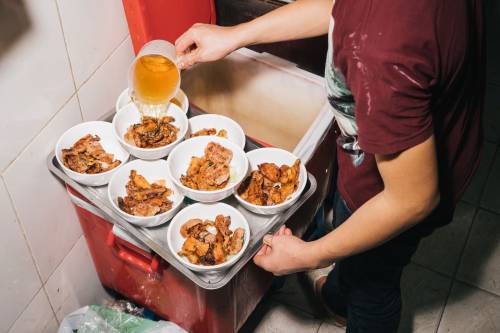
One conspicuous hazard of being Anthony Bourdain is that everywhere he goes, from a Michelin-starred temple to a peasant hut on the tundra, he is mercilessly inundated with food. He often ends up eating much more than he might like to.
On the second floor of a local athletic complex, we found a mirrored, padded room that served as a jujitsu gym. Bourdain changed into a white terry-cloth gi, strapped on his blue belt, and greeted several much younger Vietnamese guys. He sparred with each man in a five-minute round. Bourdain had explained to me the complex protocols of jujitsu—describing how a blue belt can ask a white belt to spar, and a black belt can ask a blue belt, but a white belt can’t ask a blue belt. He had always loved the kitchen because it was a tribe, and in jujitsu he had found another sweaty, gruelling activity with its own hierarchy and lingo, a vocabulary of signs and symbols that would be impossible for an outsider to understand. I watched Bourdain, with his limbs tangled around the body of a Vietnamese blue belt who was roughly half his age, his toes splayed, his eyes bulging, his fingers grasping for purchase on the guy’s lapel. In the heat of the clench, they whispered playful banter to each other; there was something intimate about it, like pillow talk. Then, abruptly, Bourdain flipped the guy’s body over, pinning one of his arms and bending his elbow at an unnatural angle. The guy gently tapped Bourdain’s shoulder, and Bourdain released the grip. They uncoupled and lolled on the floor for a second, like a pair of dead men. Then Bourdain looked up at the time clock. There was still nearly a minute left in the five-minute round. He rolled onto his knees, bumped fists with his opponent, and started again. ♦
An earlier version of this article misstated the location of the village where Bourdain’s relatives had a home. It also misstated the year Bourdain signed up for the writing workshop.
Sourse: newyorker.com

